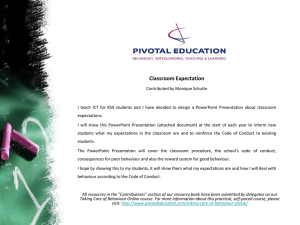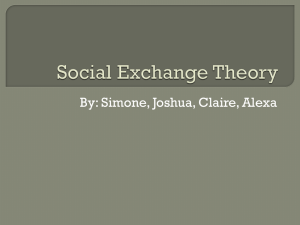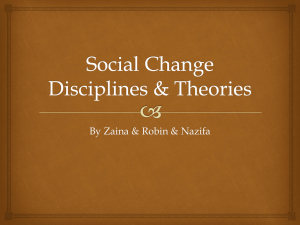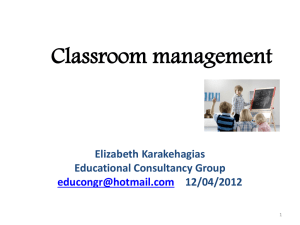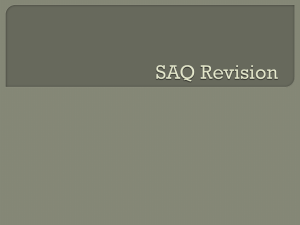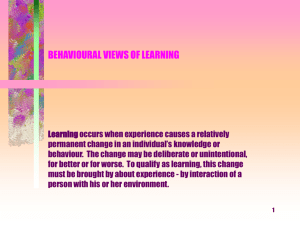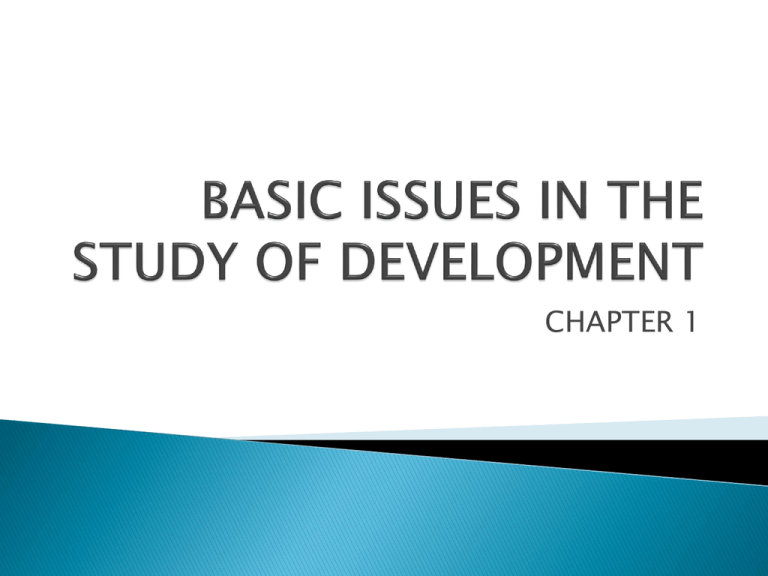
CHAPTER 1
NATURE VERSUS NURTURE
◦ Nature: idealists, rationalists
Knowledge is inborn
◦ Nurture: empiricists
The mind is a blank slate – tabula rasa
◦ Behaviourism
Behaviour changes are caused by environmental
factors
STAGES & SEQUENCES
◦ Continuity-discontinuity issue
Quantitative – continuous in nature
ie. number of friends increase from zero to many
Qualitative – discontinuous
ie. the quality of friendships increases
INTERNAL & EXTERNAL INFLUENCES ON
DEVELOPMENT
◦ Maturation: genetically programmed sequential
patterns of change
Universal – appearing in all children across cultures
Sequential – a pattern of unfolding skill or
characteristics
Impervious – relatively to environmental influence
◦ However, maturational theorists agree that
experience plays a role
◦ The Timing of Experience:
Critical period – any time period during development
when an organism is especially responsive to and
learns from a specific type of stimulation
The same stimulation at other points has little or no effect
ie. a duck at around 15 hours after hatching
Sensitive period – a period during which particular
experiences can best contribute to proper
development.
Similar to the critical period, but deprivation effects during
this period are not as severe
◦ Inborn Biases and Constraints
Pre-existing conceptions and contraints on
understanding of behaviour
ie. very young babies knowing that unsupported objects
will move downwards; moving objects will continue to
move in the same direction
◦ Behaviour Genetics
Heredity affects a broad range of behaviour
Seen through studies of identical and fraternal twins
◦ Gene-Environment Interaction
Child inherits genes, parents create environment
Inherited qualities affect behaviour, affecting reactions
◦ Internal Models of Experience
Creating by the child -- A set of core ideas or assumptions
about the world, about himself and about relationships with
others through which all subsequent experience is filtered
◦ Aslin’s Model of Environmental Influence
Maturation – no environmental effect
Maintenance – some environmental input is necessary to
sustain a skill or behaviour that has already developed
maturationally
Facilitation – a skill or behaviour develops earlier because of
experience
Attunement – when a particular experience leads to
permanent gain or enduring high level of performance
Induction – a pure environmental effect – a behaviour does
not develop at all in the absence of experience
THE ECOLOGICAL PERSPECTIVE
◦ The importance of context in which child develops
◦ Emphasizes that each child grows up in a complex
social environment
Culture – system of meanings, customs, values,
attitudes, beliefs, morals
Individualism vs. collectivism
Individualism: individual persons whose achievement and
responsibility is individual (Europe, North America)
Collectivism: emphasis is on the collective (the whole),
group solidarity, shared duties and obligations, group
decision making (Asia, Africa, South America)
VULNERABILITY AND RESILIENCE
◦ Long-term study of children
Only 2/3 of children in poverty turned out to have
serious problems
The other third – resilient – turned out competent,
confident, caring
Similar environment different outcomes
◦ Vulnerabilities – every child born with them
Temperment, abnormality, allergy, genetic tendency
◦ Protective factors – every child born with them also
Intelligence, coordination, smile,
◦ Vulnerabilities and Protetive Factors interact with
the environment produce results
PSYCHOANALYTIC
◦ Behaviour is governed by conscious and unconsious
processes
◦ Freud: argued that libido (sexual drive) is the
motive force behind virtually all human behaviour
Personality has a structure, which develops over time
The id (source of libido), ego (the “executive”, more
conscious element), superego (centre of conscience
and morality)
Infant/todder is al Id, ego develops 2-5, superego
begins to develop just before school age
Psychosexual stages: oral, anal, phallic, genital
◦ Erikson: proposed psychosocial stages
Influenced more by common cultural demands for
children of a particular age
ie. toilet training at age 2, school skills by 6 or 7
Each child moves fixed sequence of tasks
◦ Both theorists believe though that meeting the
stages depend on interactions with people and
objects in the world.
◦ When a stage is not completed, it carries forward
affecting ability to handle future tasks or stages
COGNITIVE-DEVELOPMENTAL AND
INFORMATION-PROCESSING THEORIES
◦ Emphasize primarily cognitive development rather
than personality
◦ Piaget: the central figure
All children seem to go through same discoveries,
same mistakes, same solutions
The environment does not shape the child – the child
actively seeks to understand his environment
Sub-processes: assimilation, accommodation,
equilibration
◦ Vygotsky
Complex forms of thinkking have their origins in social
interactions
Learning is guided by an adult who models or structures the
learning experience – scaffolding
New learning is best achieved in the zone of proximal
development – too hard to do alone but can manage with
guidance
◦ Information-Processing Theory
Use the computer as a model of human thinking
“encoding” – organizing info to be stored in memory
“storage” – “retrieval” –
Sensory memory – short-term memory – long-term memory
LEARNING THEORIES
◦ Emphasis on the way environment shapes the child
◦ Classical Conditioning
ie. Pavlov – acquisition of new signals for existing
responses (salivating dog)
Learning occurs when new stimulus is introduced
Other stimuli that are present around the same time as
the unconditional stimulus will trigger the same
responses
Become “conditional stimuli”
◦ Operant Conditioning
The process by which the frequency of a behaviour
increases or decreases because of the consequences
the behaviour produces
Reinforced vs. Punished
Positive reinforcement:
An added stimulus or consequence increases behaviour
Negative reinforcement:
Increases a behaviour because the reinforcement involves
the termination or removal of unpleasant stimulus
Punishment:
Weakens behaviour (ie. grounding, taking away privileges)
◦ Bandura’s Social Cognitive Theory
Learning may also occur merely as a result of watching
someone else perform an action (observational,
modeling
Intrinsic (internal) reinforcements:
ie. pride, a child feels when figuring out how to raw a star
Satisfaction you experience after exercise
Through modeling, a child acquires attitudes, values,
ways of solving problems, self-evaluation standards
COMPARING THEORIES
◦ Assumptions about Development
Is the Theory active or passive?
Is Nature or Nurture more important?
Is development Stable or Changing?
◦ Usefulness
Can the theory generate predictions that can be
measured or tested?
Heuristic value: does the theory stimulate thinking and
research?
What kind of practical value does a theory have?
◦ Eclecticism: the use of multiple theoretical
perspectives to explain and study human
development



